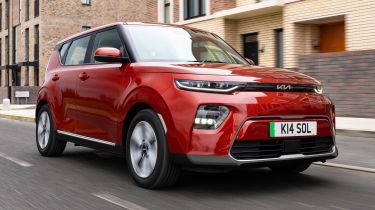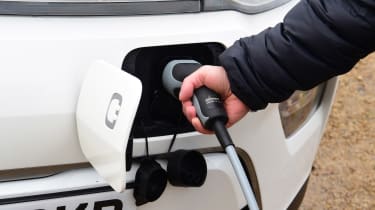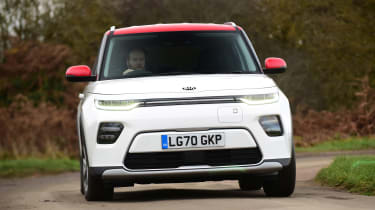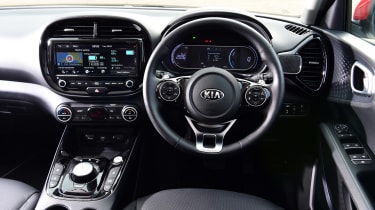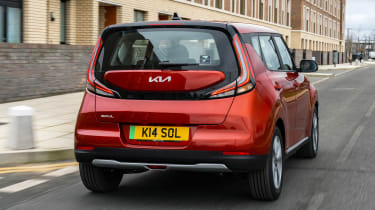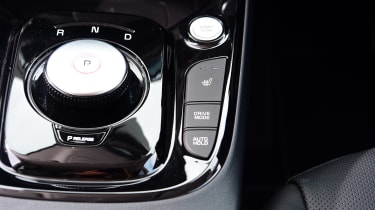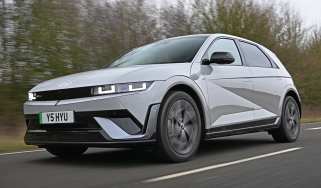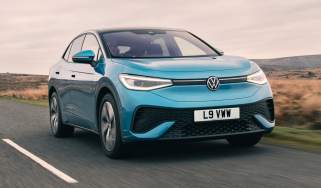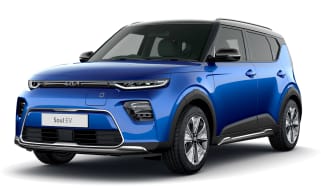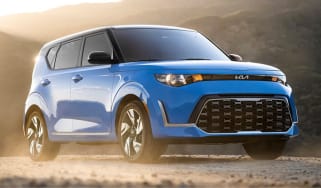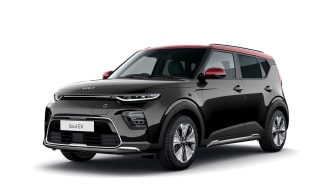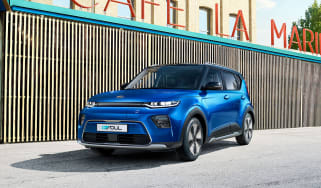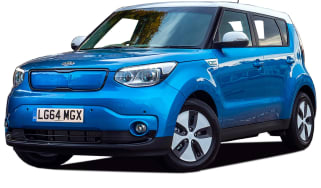Kia Soul EV hatchback
"The Kia Soul EV is a distinctive zero-emissions car with impressive performance"
Pros
- Cheap to run
- Well-equipped
- Affordable Urban trim
Cons
- Small boot
- Medicore charging speeds
- Light steering
Verdict - Is the Kia Soul EV a good car?
The arrival of a two-tier range means there’s now a Kia Soul EV for urban dwellers in need of a more affordable electric model, along with a longer-range version if you need it. This should help the quirky Kia’s appeal, along with its comprehensive kit, nippy performance and strong safety credentials. On the downside, the Soul EV no longer feels as cutting-edge as it once did, and its peak charging speeds can’t match Kia’s more expensive EVs.
Kia Soul EV models, specs and alternatives
Many manufacturers are scrambling to introduce their first electric cars, but not Kia. The Kia Soul EV is now in its second generation, and joined the highly regarded e-Niro in Kia's fully electric range, which now also includes the more expensive Kia EV6 and is set to expand rapidly in the coming years. The launch of the Mk2 also saw the Soul move into a new, EV-only era, because it's no longer available with petrol or diesel engines.
 The 10 best electric cars in 2025
The 10 best electric cars in 2025
While the original petrol Soul was a quirky, cheap and cheerful runaround, the new Soul EV is quite a bit more upmarket. It has a smoother, less polarising SUV-inspired design and the interior is well-appointed and equipped, as befitting a car that costs over £30,000.
More reviews
Launched in the lavish First Edition trim, and subsequently available only in Maxx spec, the Soul is now offered in Urban and Explore trim levels. Standard features include 17-inch alloy wheels and an eight-inch touchscreen with a reversing camera, while Explore adds numerous features such as heated surfaces, leather upholstery and an upgraded 10.25-inch touchscreen with navigation. There's plenty of room inside courtesy of the Soul's high roofline but the 315-litre boot may disappoint, as it's less luggage space than the latest crop of superminis can manage.
The advanced technology underneath the Soul EV's body goes some way to justifying the car’s price. The Explore trim is fitted with a large 64kWh battery pack - the standard Nissan Leaf has a 40kWh pack - and a potent 201bhp electric motor. This gives it an impressive driving range of up to 280 miles, along with acceleration from 0-62mph in 7.9 seconds.
MPG, running costs & CO2
While it was initially launched in range-topping form, the Kia Soul EV now also comes in a more affordable Urban guise, with a smaller battery pack to keep costs down to around £33,000 – a sizeable saving of £6,000 or so. With a capacity of 39kWh this has an official range figure of up to 171 miles, however, Kia claims it’s possible to squeeze up to 250 miles out of a single charge at city speeds. This makes it a good buy for anyone who rarely heads out on the motorway for longer distances, and during our test drive we were able to manage around 4.2 miles/kWh for a projected range of around 163 miles.
Charging for the Urban tops out at 100kW, for a 10-80% top-up in 47 minutes, so it’s not as speedy as some rivals but should prove well-suited to charging via a home wallbox.
The Soul EV Explore’s range of 280 miles is almost identical to the 285-mile range of the Kia Niro EV, while surpassing the 260-mile range of the updated Citroen e-C4. It's also just as fast to charge as the Citroen, at speeds of up to 100kW via its Type 2 connection. Charging at 100kW from a DC rapid charging station takes the battery pack up to 80% in just under an hour, while a standard 7.2kW wallbox takes around 9.5 hours to fully replenish the battery.
Road tax is also free for electric cars until 2025, a saving of around £180 per year. Business buyers will also benefit from lower monthly payments, thanks to a very low Benefit-in-Kind (BiK) rate for electric cars.
A warranty might not usually be seen as a cost-saver, but the Kia's seven-year standard policy certainly should be. Not only is it likely you’ll save money on repairs over the seven years, extending the warranties of most rivals (usually to just five years in length) can cost hundreds of pounds.
Engines, drive & performance
Setting off in the Soul EV begins with twisting its circular gear selector from N to D, after which you can drive away in near silence. In the Urban version, the motor sends 134bhp to the front wheels, for a 0-62mph acceleration time of 9.9 seconds. That might not sound too impressive, but the Urban feels plenty quick enough off the mark thanks to its instant power delivery. The super-light steering also feels best suited to city streets, but we wish it offered a bit more resistance in Sport mode.
The Explore version is no slouch, with 201bhp and 395Nm of torque giving it hot hatch levels of power. Use all the electric motor's performance and the Soul can get from 0-62mph in 7.9 seconds, while its 0-30mph is even brisker and lag-free, making nipping into gaps easy. It's easy to provoke some scrabbling from the front tyres if you’re too aggressive with the accelerator.
There are Normal, Sport and Eco driving modes, and we found the steering too light in Normal and Eco, with little feel on offer. Play with the paddles behind the steering wheel and you can adjust the level of regeneration and the braking effect of the electric motor as you come off the accelerator. In the highest of the four settings this will bring the EV to a complete stop, allowing 'one-pedal' driving, where the conventional brakes are only needed for more sudden stops with some practice.
Interior & comfort
Lugging around a heavy battery pack means many EVs end up with stiffer, less comfortable suspension. The Soul EV models we've tried so far rode fairly comfortably, with only sharper bumps sending a shudder inside.
If you've been disappointed with the interior quality of the older Soul, you could be in for a surprise because it's taken a noticeable step up in desirability with this latest model, at least in Explore trim. Not only are there soft-touch plastics on top of the doors and dashboard, the switchgear feels good to press and twirl, and the 10.25-inch widescreen looks impressive. The larger screen also allows different pieces of information like the sat nav and trip computer or media to be displayed alongside each other.
The Soul EV Urban doesn’t feel quite as plush, because hitting a lower price point means Kia has swapped the steering wheel for a plastic item and the central touchscreen is downgraded to an eight-inch unit with less crisp graphics.
The Soul EV was previously only available in Maxx trim, which was a range-topping specification including a head-up display and seven-inch OLED screen within the instrument binnacle, along with a wireless phone charger, rear-view camera and 10-speaker Harman Kardon sound system with a subwoofer.
Introduced in 2023, Urban is an entry-level version aimed at making the Soul EV more affordable. It still comes with 17-inch alloy wheels, an eight-inch touchscreen, a seven-inch OLED instrument display, a reversing camera and LED headlights.
Explore costs closer to £40,000 and brings a 10.25-inch touchscreen with navigation and connected features, black leather upholstery and a heated steering wheel and front seats. Buyers can also expect LED headlights and keyless entry.
Practicality & boot space
The Soul EV’s upright shape means it feels spacious for occupants, and its tall roofline means adults should find plenty of headroom in the back, even if the rear bench isn’t the most comfortable. While most electric cars struggle with boot space because of their large battery packs, the Soul EV's has jumped in size to 315 litres (a 34-litre upgrade on the previous model). That's still fairly compact for a crossover though – even the stylish DS 3 Crossback E-Tense boasts 350 litres, despite its more rakish roofline.
Things get even worse if you compare the Soul EV against non-electric models like the Volkswagen T-Roc and MINI Countryman, which have around 450 litres of luggage space. If you need more space, you can fold down the rear seats to liberate up to 1,339 litres.
Kia also hasn't provided any towing figures for the Soul EV, which means we wouldn't recommend hauling any trailer behind it. This could be a deal-breaker if you don't own a second vehicle that you can use for towing instead.
Reliability & safety
In theory, electric cars should be far more reliable than their combustion-engined counterparts. There are fewer moving parts and service items like spark plugs and oil filters, and energy recuperation takes a lot of strain off the brakes. This isn't Kia's first EV, so you'll be buying a model from one of the most experienced manufacturers of electric cars. The Soul is backed up with Kia's standard seven-year/100,000-mile warranty.
While the Kia Soul didn't appear in our 2022 Driver Power owner's satisfaction survey, the closely-related Kia Niro finished in an impressive 12th place, while the Kia e-Niro came in 20th. Both scored highly across the board, particularly for running costs, reliability and build quality, while Kia came third overall out of 29 manufacturers.
Kia also performs well in safety tests, and the Soul EV is loaded with the manufacturer's latest safety kit. This includes autonomous emergency braking, lane keep assist, blind-spot detection and systems to help warn of oncoming traffic when reversing.
